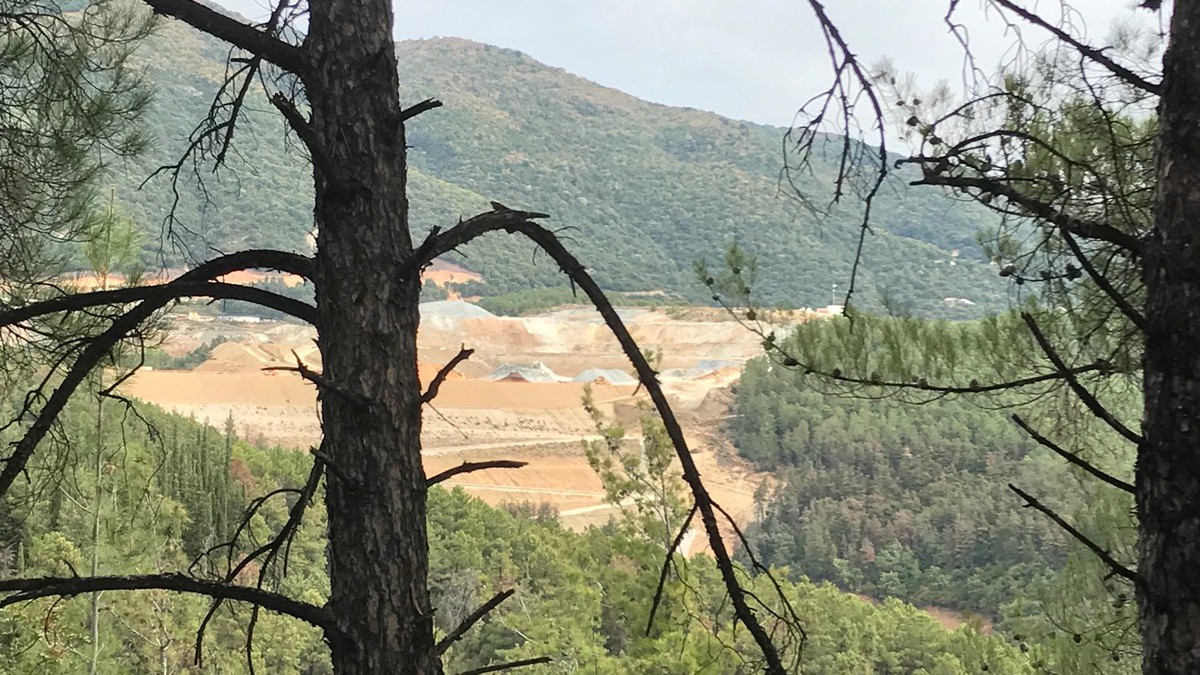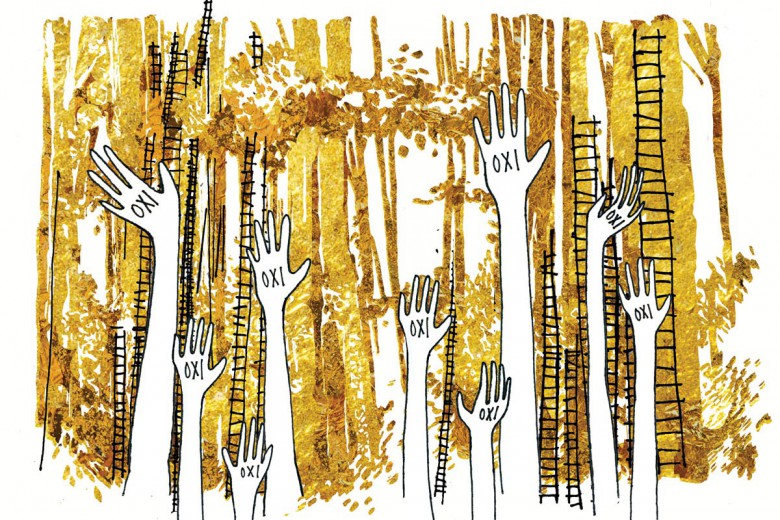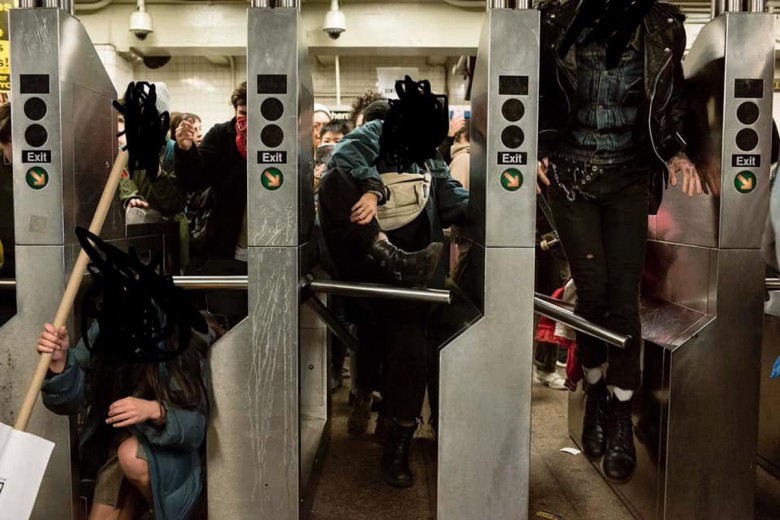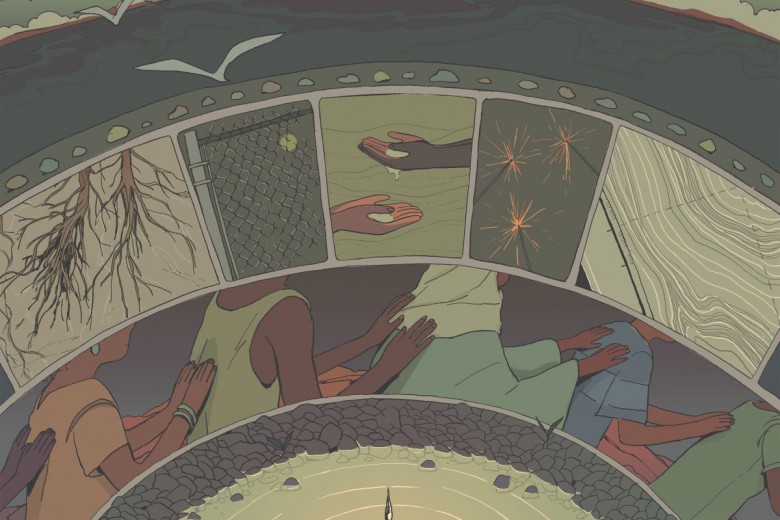The international news media started paying attention to the anti-mining struggles in Halkidiki, Greece, again on September 11. On that day, Vancouver-based Eldorado Gold, one of Greece’s largest foreign investors, threatened to suspend all but maintenance operations in the country as of September 22 if pending operating permits were not immediately approved and details of the government’s proposed arbitration provided. Earlier in 2017, the Greek government had held up Eldorado’s developments when it announced its intention to take Eldorado Gold to arbitration over a possible breach of contract relating to what the Ministry of Environment and Energy saw as a flawed 2014 technical study of its proposed metallurgy plant. The company argued that the initial environmental impact assessment approved in 2011 (without public consultation) covered all aspects of its developments and so saw the pending arbitration as unnecessary delay.
Eldorado’s threat led mining unions and contractors employed by the company to call a 48-hour strike to pressure the government to grant the permits. The Greek media (largely controlled by the same interests as Eldorado’s Greek subsidiary, Hellas Gold) reported that more than 2000 workers had marched on Athens, briefly storming the Ministry of Environment and Energy and demanding that the Greek government intervene to save their jobs.
Villagers I met last week in Ierissos, Halkidiki, suggested the crowd in Athens was much smaller than 2000, of which some 150 were non-miners bussed in by Hellas’ contractors – including Ellaktor, Greece’s largest construction firm tightly tied to the scandalously rich Bobolas family, which also owns a major Greek publishing company and many major media outlets.
Canada’s Trade Minister François-Philippe Champagne even intervened on behalf of Eldorado, announcing: “We do that all the time when we see that Canadian companies operating abroad are not treated fairly in light of the rights and the regulations in that country. … Canada is a G7 country and when Canada speaks people listen.”
It looked akin to the coordinated blackmail of the government that Greeks have seen many times before. And by Thursday, September 21, the tactics had worked.
Now the workers have returned to their jobs, and Eldorado is back in the forest of Halkidiki, with some (actually, previously promised) permits in hand, and a timeline for arbitration on the validity of the technical study set.
But, also last Thursday, 21 local residents of Ierissos and other villages in the Halkidiki region won a victory in their anti-mining struggle when they were acquitted on one of the sets of felony charges against them that stemmed from claims of violent incidents, including discharging of explosives, at a local municipal meeting in March 2012. The case had been launched by the pro-mining Christos Pachtas, then the mayor of the municipality of Aristotle and formerly the deputy finance minister who was deeply involved in many of the early mining concessions and construction deals that facilitated the opening of the mines.
According to members of the local Citizens Coordinating Committee of Ierissos (CC) – a key member of the broader SOS Halkidiki movement – the charges had come complete with dubious witness statements by people, some of whom later tried to rescind them. The trial judge found the witness statements unsubstantiated and all the charges relating to this case were dropped.
The acquitted and other members of the CC – which includes people who have spent time in jail for such crimes and some of the accused in this case – felt vindicated. One expressed his relief to me in an impromptu conversation. “The courts validated us,” he said. “It was the vindictiveness of a former mayor with deep ties to mining that had led to those charges. … [T]here was no criminal activity as they had claimed. But the whole process held us hostage.”
The estimated cost of approximately €800,000 in legal fees is a heavy weight for small community organizations to bear.
Court cases on other charges related to anti-mining protests will continue through the next few years. Those charges extend to some 450 people. The estimated cost of approximately €800,000 in legal fees is a heavy weight for small community organizations to bear.
In his exoneration, the judge who presided over the case was clearly perturbed by the misuse of the system: “It is sad that a local society is divided and brought to court to find justice.” But the entrenched interests are about far more than local dysfunction. As Ierissos activist and resident Jenny (not her real name) noted sardonically: “You think becoming a municipal mayor after being a national Deputy Minister of the Economy was a demotion?”
Community perspectives on the struggle
The CC called an assembly one evening during my stay in Ierissos. As the guest speaker, I was on the hot seat for a lot of it; they had many questions for Canadians, and about Canadian state support of the mining industry. I too had questions – particularly what they wished to communicate to social movements outside of Greece at this point in their struggle, what these news events mean for the local struggle, and what the current silences from the movement – the apparent abatement of force reported on by many in the progressive media – are about.
The messages they wanted to send to Canadian social movements were many – and not always from a singular perspective. I am still processing those messages, but given recent reporting about this and other social movements in the Syriza era, there are two messages that seem most pertinent.
The first regards the CC and the broader SOS Halkidiki movements’ position (or lack thereof) vis-à-vis Syriza, the centre-left government that had come to power on a pro-environmental, anti-austerity platform, only to capitulate to the “troika” within months of taking office, signing new memoranda and upholding deals with all sorts of capital – including the mining investors.
Some at the assembly seem to truly sympathize with leader Alexis Tsipras, and take a wait-and-see approach. Others shrug, seeing Greece as a constant victim, and Tsipras’ hands as tied. Still others feel betrayed, are militant, and see the task of the movement to be fighting the government, which they consider to be representative of only elite class interests. But my overall sense was that many people don’t see their struggle as reducible to their relationship with Syriza – or any other political party. “We in this town voted against all the existing parties – because we don’t believe in them” said one woman.
To me, the self-portraiture is of an ongoing struggle – from a grassroots amalgam of parents, teachers, electricians, the unemployed, and pensioners – with a common enemy, Eldorado Gold. Discussion about root causes, which included naming “capitalism” and “capital accumulation” – did not cause eye-aversion or outright rejection, despite many people’s histories of voting for right-wing parties. And I had an overall sense that the struggle itself was politicizing them against electoral answers.
Every movement has its ebbs and flows. Mature movements become more politicized and more savvy – about the law, about conflict, about the nature of the game.
That said, it is undeniable that there is residual collective disappointment at how things have turned out under Syriza. The current anti-mining mayor was clear: “Perhaps our largest problem is because [the mining issue] was not solved early on, and now we are suffering tiredness and disappointment – there is complaining among us – because we have been six years without success. Many of the tools we have used before we have abandoned, but we know if we want our struggle to continue we will have to find more….” But, to be clear, “we are not on hold.”
Then there’s the second message about the movement right now. Summarily I heard this: Every movement has its ebbs and flows. Mature movements become more politicized and more savvy – about the law, about conflict, about the nature of the game. Those lessons manifest in new forms of struggle, some taking precedence over others during moments of reflection. But reflection should not be seen as retrenchment.
“We are fighting a legal battle right now. And we won an important victory last week,” expressed Jenny. “What we want is reciprocity in our relations – not more extraction.”







